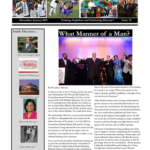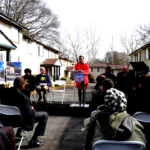Atlanta is 100th City Worldwide to Actively Study Resilience
Resilience isn’t exactly a household term. The word itself is malleable, and tends to be used as a catch-all term—physical resilience, mental resilience, workplace resilience. The City of Atlanta, along with The Rockefeller Foundation, thinks it applies perfectly to cities.
Atlanta was selected, along with 99 other cities, to participate in the 100 Resilient Cities initiative. Pioneered by The Rockefeller Foundation, 100 Resilient Cities is a three-phase process to help identify areas of strife—chosen by citizens themselves—and develop a Resilience Strategy to proactively address those issues.
So what is resilience, actually? Merriam-Webster’s definition is “an ability to recover from or adjust easily to misfortune or change.”
When applied to an urban environment, Rockefeller defines resilience as “the capacity of individuals, communities, institutions, businesses and systems within a city to survive, adapt and grow no matter what kinds of chronic stresses and sudden shocks they experience.”
Essentially, urban resilience is how cities thrive despite challenges—especially challenges that affect poor and vulnerable populations.
The Resilient Atlanta program relies upon comprehensive, city-wide outreach via online survey that the Rockefeller Foundation provides, which the Resilience Office staff then codes by hand into a tracking tool.
The Atlanta Office of Resilience, recognizing technological barriers and the need for a more equitable way for citizens to voice their opinions, also established a Google Voice line, are visiting existing community meetings and organizing community conversations to collect feedback. This enables Resilience Office staff to code this feedback into the tool as well.
The survey asks citizens to provide feedback on shocks and stresses that they feel affect the city most. Stresses are vulnerabilities that weaken the fabric of a city on a day-to-day basis, such as aging infrastructure, transportation quality and poverty. Shocks are sudden events that threaten a city, such as disease outbreak, winter storms and cyber attacks.
To coordinate and facilitate the survey dissemination, speaking engagements and conversations with key Atlanta stakeholders, Rockefeller funded a Chief Resilience Officer position, to which Mayor Kasim Reed appointed former Atlanta Director of Sustainability, Stephanie Stuckey, in November 2016.
“Cities are where resilience is put into action,” said Stuckey. “Thanks to Mayor Reed’s leadership, Atlanta is broadening our efforts beyond sustainability to tackle the physical, social and economic challenges that are a growing part of the 21st century.”
The three phases of the 100 Resilient Cities process are:
- Resilience Perceptions and Actions Inventory (city-wide outreach)
- Identify Top Priorities (analyzing three areas of strife the community identified)
- Identify City Resilience Strategy (draw up a Resilience Strategy).
The typical timeline is two years. Atlanta, still in phase one, is on an extremely expedited timeline (nine months) to complete the strategy before Mayor Reed leaves office in Fall 2017!
To contribute to Atlanta’s future Resilience Plan, please call 470-223-2908 to voice your opinion or visit ResilientAtlanta.org to take the survey in either English or Spanish. When you’re done, share it with your network via the sample social media options on our website!


